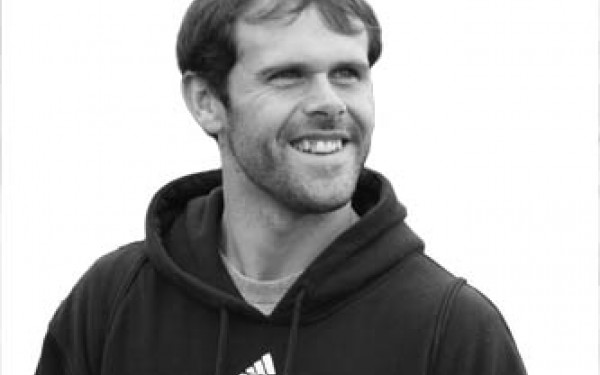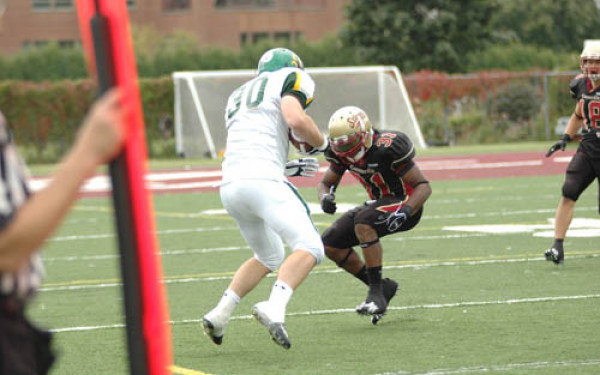Of Coaches and Coronaries
Being a Varsity Sports Head Coach has a Dark Side
OTTAWA (CUP)—Former University of Florida Gators football head coach Urban Meyer had a 103–23 career record in the NCAA, winning two national championships by using a variation of the spread offence to perfection.
Yet, after the 2010 season, the 46-year-old decided to leave the profession for good, citing health concerns and a need to be with his family.
At the University of Ottawa, a similar situation occurred this past February when Denis Piché, the head coach of the Gee-Gees football team, abruptly resigned from his position.
Piché wanted to spend more time with his family—something that his job didn’t allow him many opportunities to do.
“The reality is that the job demands over 3,500 hours per year and 16–17 hours per day during the regular season,” he told The Fulcrum. “And when the team isn’t practising or playing, we’re visiting schools across the country, talking to recruits and going to the combines at night. It’s not the easiest setup.”
So, how stressful is it to be a head coach of a varsity sports team? The Fulcrum surveyed current coaches on campus in hopes of accurately answering this question.
Long, Long Hours
It’s no secret that coaching is not a typical nine-to-five job. Meyer even called it a “24/7 profession.”
It turns out that the former Florida football coach wasn’t exaggerating by much.
“Several years ago, at the request of my wife, I logged my hours for a week during the season, and a week during the off-season. The numbers surprised me,” Gee-Gees women’s soccer head coach Steve Johnson wrote via e-mail.
“I knew that I put a lot of time into the program, but I was still shocked to see how much time I was devoting to the job: 63 hours in-season [and] 38 hours [during the offseason per week].”
Johnson’s colleagues were all in a similar boat; swim team coach Derrick Schoof and track-and-field coach Andy McInnis recounted past experiences when they worked over 80 hours in just a single week. But what exactly contributes to these long hours?
“[I work] in-season approximately 55 to 60 hours [per week],” Gee-Gees’ men’s hockey head coach Dave Leger explained. “This includes every aspect that impacts the men’s hockey program from fundraising, recruiting, planning, alumni relations, video preparation, practice and game preparation, game travel and human resource management.”
Winning Isn’t Everything
Every season, Meyer was under constant scrutiny from the media and the Florida supporters to deliver a winning product. This is typical behaviour at large American schools where coaches have superstar status and jaw-dropping contracts—Meyer was getting paid $4 million a year to be the head coach of the Gators.
But the story at Canadian Interuniversity Sport schools is much different. In a league where the top head coaches barely earn six-figures per season, winning is important, but it doesn’t mean everything.
“When I first started, [I] worried too much about winning and losing, [but] now the stress is more about time commitment to recruiting and finding the money to run a top-level program,” said Ottawa women’s volleyball coach Lionel Woods.
“I still evaluate [my performance] based on winning and losing, but I factor much more into it now: recruiting, academic and life success of players, alumni connection and community impact.”
Only two of the coaches surveyed listed the pressure to deliver championships as one of their main sources of stress. Instead, other factors—especially financial issues related to fundraising—seemed to be much more important to CIS coaches.
This isn’t exactly surprising when considering the differences between the CIS and the American college sporting world.
“The financial remuneration is reflective of the demands in major Division I sports [in the U.S.] and [is often] more than most Canadian sport institutional expenses and revenues combined,” McInnis said.
To quit or not to quit?
Most of the Gee-Gees head coaches admitted that coaching is a high-stress profession. Many sympathized with Meyer’s predicament and the circumstances that led him to retire at the age of 46.
“I have [also] experienced burnout several times in my career and have had to step back and re-energize.
Although there is no perfect time to step back, it is better to recognize it earlier and [to] make the adjustments to cope with the situation,” said Johnson.
“It is a difficult challenge at times, to realize a true balance between work and family—I am married and have two [young] daughters. It is tough to always be walking out the door at night or on the weekends, but I am blessed with a very supportive wife,” Leger added.
Still, Johnson and Leger both said they don’t regret becoming coaches, despite the long hours and high levels of stress that come with the job.
“I made the decision a long time ago to be dedicated to the game of hockey and I will always look to remain in the game in some capacity,” said Leger.
“I enjoy coaching. I have certainly committed much of my life [to] this profession, but the skill-set I have developed fits in neatly with my other job as a teacher in the Ottawa-Carleton District School Board,” Johnson said.
Being a varsity head coach is tough work, but for fans of the Gee-Gees, they need not worry; it doesn’t appear likely that any of the current Ottawa coaches will resign due to stress-related issues any time soon.
This article originally appeared in Volume 31, Issue 19, published January 18, 2011.

__900_643_90.jpg)



